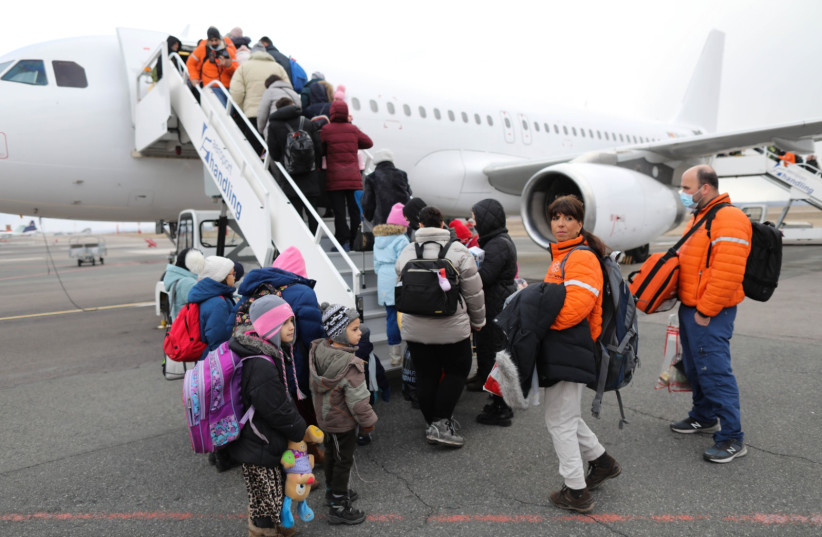The recent wave of terrorist attacks and the constant incitement from various political extremists suggest that Israeli Jews and Arabs cannot live together in peace, let alone in harmony. But the daily reality is more complex.
I got a touching reminder of this on Passover evening, when I helped over 70 Ukrainian refugees celebrate their first holiday in Israel in the heart of Nazareth.
Yes, I spent Passover Seder with 70 Ukrainian refugees in the middle of Nazareth. It sounds like the punch line to a joke, but in reality it was emotional and heartwarming.
The Aliyah and Integration Ministry partnered with several other organizations to organize communal Seders in 41 hotels spread around Israel for thousands of new Ukrainian and Russian immigrants.
These people had very little time to plan out their aliyah, and arrived with nothing more than a suitcase or two, still processing the trauma they experienced. When I heard that the Beit Hillel organization was recruiting Seder facilitators, I didn’t hesitate; it would be an honor to play a small part in helping welcome our newest immigrants.

“There’s a hotel in Nazareth where refugees are staying, and we could really use you there. But there’s no Jewish community anywhere around, there won’t be any synagogue service, and the hotel itself isn’t kosher.”
Of course, I said yes.
The days leading up to Passover were hectic: phone calls and Zoom sessions with coordinators from the ministry, IDF Home Front Command, Beit Hillel and various Jewish organizations and government agencies.
Wissam, the manager of the Golden Crown Old City Hotel, assured me that the hotel would have whatever we needed.
Knowing to set reasonable expectations, I told Wissam that we needed matzah and grape juice; if we had that, we’d manage. I packed a Seder plate, haggadot and gifts to give to any kids in attendance, and headed up to Nazareth, not knowing what was in store, but sure that it would be a memorable Passover.
FROM THE moment I arrived, I could feel the excitement. I went straight up to the dining room. To my surprise, every table had its own Seder plate.
The chef, Rami, came out to greet me with a huge smile.
“We’re just missing the zeroa [roasted shank bone]; we’re putting those out now,” he told me. “Is it okay? Are we missing anything?”
Haggadot, kippot, salt water and haroset – all there, even shemura matzot on every table. Rami’s smile got even bigger when I told him that it was perfect.
The warm feeling continued as the evening went on. My co-facilitators, Yaakov and Ilana, and I led a short introduction to the Seder, with Ilana translating to Russian. Then Ilana led the women to light candles in the corner.
Kadesh – we recited kiddush in Russian and Hebrew, and so on, until we reached the Maggid section of the Haggadah. Children came up to the front of the room and recited “Ma Nishtana” (the Four Questions) in Hebrew and Russian, and I gave them small gifts afterward.
We read an abbreviated version of the Haggadah, discussing the essential Passover, matzah and maror elements in Hebrew and Russian or Ukrainian, mixing in songs and trivia questions with prizes.
During the meal I heard from many participants that it was their first Seder – not just in Israel but in their lives. The excitement of the children was contagious, especially when they used the few words of Hebrew they’d already learned.
The evening went perfectly, and it was in large part thanks to the dedicated Arab staff at the Golden Crown Old City. Rami and his team took care of every detail, and everyone, from the manager to the receptionists, came to watch the Seder. They were almost as excited as we were, with huge smiles on their faces. I lost track of how many times I was asked if we needed anything.
I’d originally been told that we’d be eating on disposable plates, but Rami assured me that the entire kitchen had been made kosher for Passover, and that he himself had studied kashrut as part of his culinary training.
We made sure to thank the staff in all the languages we knew, and I even asked one of the waiters to read “Ma Nishtana” in Arabic, which he did happily.
ONE MAGICAL Passover evening can’t undo the trauma our brethren have suffered in Ukraine, nor can it repair our own conflict here in the Holy Land. But it was a reminder that for every Jewish or Arab extremist who wants to divide us, there are many more people who want to live not just in peace and quiet, but with true respect of what makes us unique.
Before I left for Nazareth, I tried to give away a box of cereal to a Muslim neighbor, but she refused.
“I can’t take this; my house is kosher for Passover also.”
“You keep Passover?” I asked in surprise.
“No, but my roommate is Jewish, and she does. We need to respect one another.”
So true. If we treat one another with love and respect, well beyond the “letter of the law,” then we can find not just peace, but true happiness.
I saw that lesson exemplified in Nazareth this Passover. I hope that our newest immigrants will find peace and happiness here after the war they’ve been through, and I hope that we can also spread the lesson that respect and love trump war and hate.
The writer is the founder and codirector of Debate for Peace.
